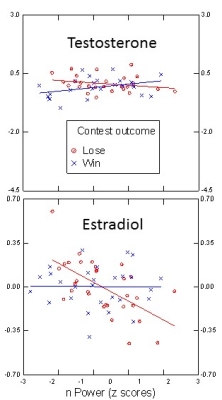Competition, aggression, and hormones
|
In a study published by PLOS ONE, psychologists working at Friedrich-Alexander University, Erlangen, Germany, have looked at the relationship between competition, aggression, and hormones in human research participants. With the support by Alexander-von-Humboldt Foundation, Dr. Jonathan Oxford, Prof. Dr. Oliver Schultheiss and their team had participants go through 10 rounds of a competitive task in the lab, either as individual competitors or as teams of competitors, with half losing the contest and half winning it. Throughout the competition, participants could aggress against their opponents by setting the severity of a noise blast they would receive after losing a round. Hormonal changes were measured in saliva samples collected before and after the contest.
The research team found that men aggressed more than women, losers more than winners, and teams more than individuals. Moreover, aggression was associated with participants’ stress hormone cortisol, with lower cortisol being mostly associated with higher aggression. As Oliver Schultheiss, the senior author of the publication, remarks, “Our findings show the usual suspects of aggression – being male, being frustrated. But they also show that it’s easier to aggress from within a team than as an individual. And they show that stress hormone levels associated with feeling overwhelmed are actually associated with less aggression. Not further escalating an inherently aggressive competition if you already feel you are in over your head is actually a rather adaptive response.”
Oxford, Schultheiss, and their team also found that for women in particular, the need for power made a big difference for how they responses hormonally to winning or losing the competition against another woman or team of women. Women high in power motivation showed higher testosterone and estradiol levels after winning than after losing, whereas women low in power motivation did not show this response. According to the study’s authors, power-motivated women thus show an adaptive hormonal response pattern that reinforces dominant behavior after a success, but inhibits it after a defeat. |

Significant interactions of nPower and contest outcome on changes in salivary testosterone and estradiol in naturally cycling women reported by Oxford et al (2017).
|
Jonathan Oxford is now an assistant professor of psychology at Southern Arkansas University, Magnolia, USA (https://web.saumag.edu/directory/contact/oxford-jonathan/). Oliver Schultheiss is a professor of psychology at Friedrich-Alexander-University, Erlangen, Germany (http://www.psych2.phil.uni-erlangen.de/~oschult/humanlab/).
The referenced paper will be published as:
Oxford, J., Tiedtke, J. M., Ossmann, A., Özbe, D., & Schultheiss, O. C. (in press). Endocrine and aggressive responses to competition are moderated by contest outcome, gender, individual versus team competition, and implicit motives. PLoS One.
Women are more affiliation-motivated than men
Why the power-motivated are better at parking their cars
New meta-analysis: Low to no correlation between implicit and explicit motive measures
Content-coding motive measures can be approcimated with automated word counts
Exploiting the full potential of thematic apperception through profile analysis
High progesterone is associated with less coherent brains (August 2012)
What color naming speed reveals about the wisdom of
one's goal choices (December 2010)
Are you high on testosterone and is that a good thing? Listen to Podcast of interview with Dr. Oliver Schultheiss on UM NewsService
New edited book on implicit motives available (October 2009)
What the word "not" may reveal about your ability to handle stress (October 2008)
Estrogen fuels female power (February 2008)
High-testosterone people reinforced by others’ anger, new study finds (February 2007)
Study finds US students more motivated to achieve, less power-hungry than German students (August 2006)
Are all people stressed out by a defeat or does it hurt some more than others? (April 2006)
|

